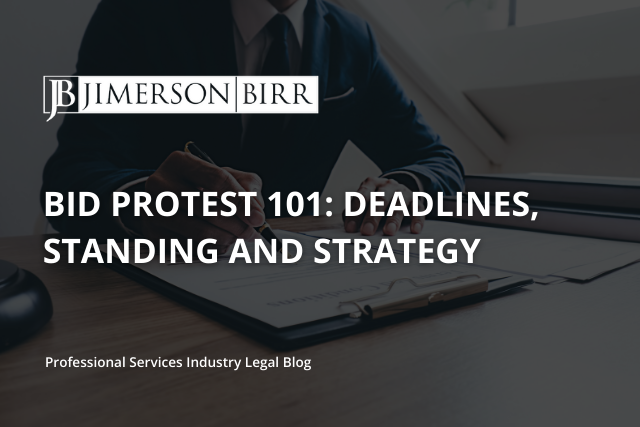Participating in Florida’s government procurement process can be both an opportunity and a challenge. Agencies are required to follow strict statutory and procedural rules to ensure that contracts are awarded fairly. But when those safeguards are overlooked or misapplied, contractors and vendors have the right to challenge the decision through a bid protest.
A bid protest is not simply a complaint. It is a formal legal process governed by Florida law. Success depends on acting quickly, meeting strict deadlines, and presenting well-supported arguments. This article explains the framework for bid protests in Florida so your business can protect its rights when competing for government contracts.
The Procurement Framework in Florida
Florida agencies and local governments procure goods and services using invitations to bid, requests for proposals, and invitations to negotiate. Each method has detailed requirements designed to promote transparency and fairness.
For example:
- State construction projects expected to cost more than $200,000 must be advertised in the Florida Administrative Register at least 21 days before the bid opening.
- Projects exceeding $500,000 must be advertised at least 30 days before the opening and published in a local newspaper both 30 days before the opening and five days before any pre-bid conference.
- Local government construction projects follow similar timelines, but their advertisements need only be published in the local newspaper.
If bid opening dates change, all registered bidders must receive notice. These safeguards exist so every bidder has an equal opportunity to compete.
Agencies may deviate from these procedures only in cases of emergency, such as when there is immediate danger to public health or safety, a risk of property loss, or a disruption of essential services. Even then, the emergency must be documented and narrowly tailored.
Who Has Standing to Protest
Not every disappointed bidder can file a protest. Florida law limits standing to those who have submitted a bid and who are adversely affected by the agency’s decision. This requirement ensures that only parties with a legitimate interest in the contract can challenge the outcome.
A business that did not submit a bid generally cannot protest, even if it believes the procurement was flawed. Similarly, a bidder that ranked poorly due to its own shortcomings may lack standing to challenge unless the agency’s error directly impacted the award.
Deadlines and Required Filings
Timing is one of the most critical aspects of a bid protest. Florida imposes strict deadlines, and failure to meet them almost always results in dismissal.
- The notice of protest must be filed with the procuring agency within 72 hours of the award being posted. The 72-hour window is a hard clock, meaning that missing it, even by minutes, can bar the protest.
- The formal written protest must be filed within 10 days after the notice of protest. This document sets out the legal and factual grounds for the challenge and is filed with the Division of Administrative Hearings.
- The protesting party must post a bond equal to 1 percent of the estimated contract value. This bond protects the agency against frivolous protests and ensures that only serious challenges proceed.
The financial risk does not end with the bond. If the protest is unsuccessful, the protesting party may be responsible for the agency’s costs and attorneys’ fees.
Grounds for a Bid Protest
A bid protest must be supported by legitimate, legally recognized grounds. Common grounds include:
- Failure of the agency to follow statutory procedures for advertising or awarding the contract
- Ambiguities in the solicitation documents that created an uneven playing field
- Improper evaluation of bids or proposals, including scoring errors
- Conflicts of interest or bias in the selection process
- Violations of agency rules or procurement statutes
Because protests are closely scrutinized, identifying strong grounds is essential. A weak or poorly supported protest can not only fail but also expose the bidder to additional costs.
Strategic Considerations
Given the high stakes, businesses should carefully evaluate the risks and rewards of filing a protest. A successful protest can lead to the reversal of an award or the re-bidding of a contract, but the process requires a significant investment of time, money, and resources.
Before filing, businesses should:
- Conduct a thorough review of all solicitation documents and agency correspondence
- Compare their bid against competitors to identify scoring or evaluation errors
- Document any irregularities or ambiguities in the process
- Consult with experienced counsel to assess the likelihood of success
Engaging legal representatives early is crucial. Procurement law is highly technical, and agencies defend their processes vigorously. A knowledgeable attorney can help ensure that filings are timely, arguments are persuasive, and risks are appropriately weighed against potential recovery.
Conclusion
Bid protests are powerful tools for holding agencies accountable and protecting your rights in Florida’s procurement process. But they are also highly technical proceedings with unforgiving deadlines, strict standing requirements, and significant financial risk.
For businesses considering a protest, the key is preparation. Know the rules, act quickly, and build your case on solid legal and procedural grounds. With the right strategy and representation, a bid protest can not only safeguard your investment in the bidding process but also strengthen your long-term position in the government contracting market.
You want a firm to help with all your procurement-related matters. The sooner you contact us, the sooner Jimerson Birr can put its governmental expertise to work for you. We know Florida.

